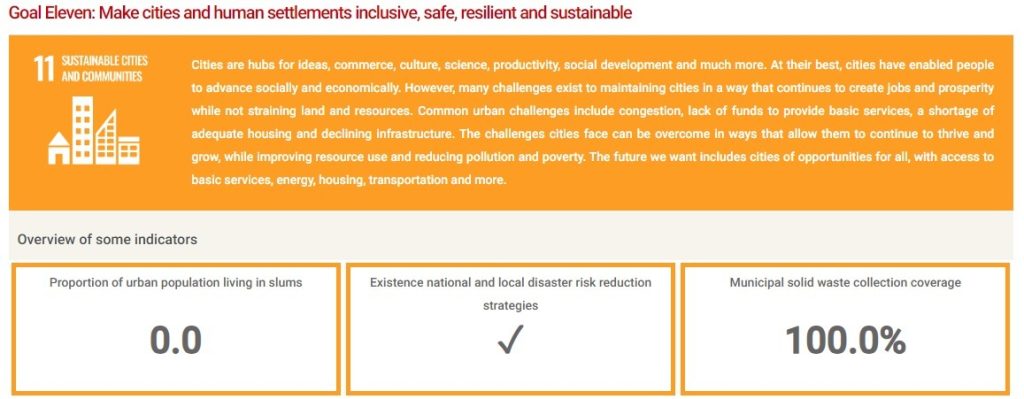SDG 11 - Sustainable Cities and Communities
The University has implemented several initiatives to promote public access to cultural heritage events, green spaces, and libraries.
To provide public access to buildings and cultural heritage events, the University has opened its doors to the public and welcomes visitors to explore its campuses. The university also collaborates with local authorities to address planning issues and development.
In terms of public access to libraries, the University provides public access to its library resources, including books and publications, by offering a username and password for the library’s e-resources. This enables individuals to expand their knowledge inside and outside the University campus and supports the development of education.
Moreover, the University library provides a welcoming space for people to use these library resources in a way that promotes community engagement. The library portal offers a research room option that allows individuals to reserve a space in the library where they can work on their research projects and collaborate with others.
Gulf University is committed to supporting the Kingdom’s initiatives towards achieving SDG 11, which is centered on Sustainable Cities and Communities.
Through close partnerships with the government such as collaboration with local authorities to address planning issues and development and also with NGOs and private sector, and providing public access to university buildings and cultural heritage events, workshops, discussions the university has opened its doors to the public and welcomes guests and visitors to explore the campus. GU actively works on developing and implementing creative solutions to advance technology, innovation, and infrastructure within urban settings. By participating in community-driven activities such as organizing Sustainability Week and dedicated one day only for SDG11 activities, showcasing technological innovations, and hosting educational workshops that highlight sustainable infrastructure advancements, GU is actively contributing to shaping a more resilient and technologically progressive future for Bahrain while aligning with the objectives of SDG 11 which is make cities and human settlements inclusive, safe, resilient and sustainable. These collective efforts underscore the university’s significant role in promoting sustainable urbanization, fostering innovation, and improving infrastructure to create inclusive and sustainable communities for all.
The Government of Bahrain has made significant advancement in achieving SDG 11: Sustainable Cities and Communities. The government has implemented a comprehensive housing strategy, focusing on the development of sustainable and affordable housing through public-private partnerships. The new Bahrain International Airport, designed with sustainability in mind, has received international recognition for its eco-friendly practices. Additionally, Bahrain’s rich cultural heritage, including UNESCO World Heritage sites, is being preserved and promoted as part of its sustainable development efforts.
Housing, Urban Planning and Innovative Programs
Bahrain’s housing strategy, in accordance with the New Urban Agenda issued by UN-HABITAT has moved towards smart cities, whereby urban areas can become more efficient, livable, and sustainable in the short and long term. The Government of Bahrain delivered on its commitment to provide 40,000 housing units to citizens, between 2013 and 2022, through the construction of five new cities, financed through the GCC Development Program and through partnership with the private sector; namely: Salman City, Khalifa City, East Hidd, East Sitra and Al Ramli. Bahrain’s housing sector has been at the forefront of the public-private partnership model of economic development. Under the social housing financing program ‘Mazaya’, Bahraini citizens can secure subsidized loans to purchase fully built homes, where the subsidy is means-tested and designed to offer the largest support to those with limited means.
Transportation
The new Bahrain International Airport, opened in 2021, was built with sustainability as a primary goal, and in a manner consistent with Bahrain’s renewable energy and energy efficiency action plans. The terminal has received numerous sustainability awards, including the ACI Green Airports Recognition Silver Award 2023, that recognizes Bahrain Airport’s sustainable initiatives, focusing on energy efficiency, waste management, and reducing carbon emissions in its operations.
Preserving Culture and Heritage
Bahrain has three UNESCO World Heritage sites that are integrated with its tourism offering through the efforts of the Bahrain Authority for Culture and Antiquities: Qal’at Al-Bahrain, a medieval fort; the Pearling Trail, which is a series of buildings and sites that tell the story of Bahrain’s pearling industry; and the Dilmun Burial Mounds, that date back to around 2000 BC and the Early Dilmun Civilization.
Bahrain efforts for SDG 11

Last Updated on January 14, 2026 @ 01:31:43 pm

